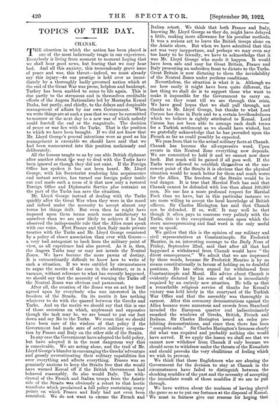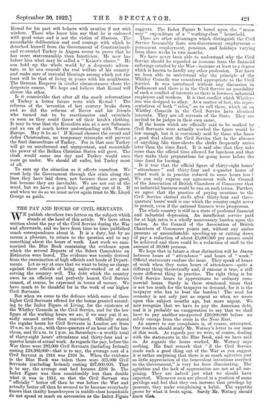TOPICS OF THE DAY.
CHANAK. THE situation in which the nation has been placed is one of the most ludicrously tragic in our experience. Everybody is living from moment to moment hoping that we shall hear good news, but fearing that we may hear bad. And all this anxiety, this tremendously grave issue of peace and war, this threat—indeed, we must already say this injury—to our prestige is held over us imme- diately by a thoroughly badly governed nation which at the end of the Great War was prone, helpless and bankrupt. Turkey has been enabled to come to life again. This is due partly to the strenuous and in themselves creditable efforts of the Angora Nationalists led by Mustapha Kemal Pasha, but partly, and chiefly, to the delays and despicable management of affairs by our own Government. When we write things are at such a pass that we may be committed to-morrow or the next day to a new war of which nobody could foretell the end or the magnitude. The decision of peace or war lies with the Turks. That is the position to which we have been brought. If we did not know that Mr. Lloyd George's general intentions were as good as his ?management is execrable we should have said that we had been manoeuvred into this position maliciously and deliberately.
All the lessons taught to us by one able British diplomat after another about ttke way to deal with the Turks have been ignored as though they did not exist. If the Foreign Office has spoken it has not been heard. Mr. Lloyd George, with his Secretariat rendering him acquiescence and mstant service, has turned our foreign policy inside out and made such a mess of it that now only a restored Foreign Office and Diplomatic Service plus restraint on the part of the Turks can save the situation.
Mr. Lloyd George instead of dealing with the Turks quickly after the Great War when they were in the mood and indeed under the necessity to accept almost any terms let things drift. But even then he might have imposed upon them terms much more satisfactory to ourselves than we are now likely to achieve if he had observed the indispensable rule that the Allies must speak with one voice. First France and then Italy made private treaties with the Turks and Mr. Lloyd George countered by a policy of closer association than ever with Greece— a very bad antagonist to back from the military point of view, as all experience had also proved. As it is, then, the Angora Turks may or may not invade the Neutral Zones. We ha-ye become the mere pawns of destiny. It is extraordinarily difficult to know how to write of such a situation. If we were entitled by circumstances to argue the merits of the case in the abstract, or in a vacuum, without reference to what has recently happened, we should say that the necessity of warning the Turks off the Neutral Zones was obvious and paramount.
After all, the creation of the Zones was an act by itself agreed Upon by everybody who was interested in the freedom of the Straits. On its merits it has nothing whatever to do with the quarrel between the Greeks and Turks. And on the merits we should say that this is one of those occasions on which, unpleasant and expensive though the task may be, we are bound to put our foot down and say No to the Turks. We mean that we should have been sure of the wisdom of that policy if the Government had made sure of active military co-opera- tion by France and Italy on the other side of the Straits.
In any case the Government have adopted the bold policy, but have adopted it in the most dangerous way that is conceivable. We are acting alone, and the trail of Mr. Lloyd George's blunder in encouraging the Greeks' adventure and grossly overestimating their military capabilities lies over everything and affects everything. France was so genuinely anxious to keep the Straits free that she would have warned Kemal off if the British Government had behaved reasonably. So also would Italy. The with- drawal of the French and Italian troops from the Asiatic side of the Straits -was obviously a retort to that hectic manifesto which proclaimed a full policy containing many points on which France and Italy had not even been consulted. We do not want to excuse the French and Italian retort. We think that both France and Italy, knowing Mr. Lloyd George as they do, might have delayed a little, making more allowance for his peculiar methods. It was a serious act to leave the British troops alone on the Asiatic shore. But when we have admitted that this act was very inopportune, and perhaps we may even say too hasty to be friendly, we have to acknowledge that it was Mr. Lloyd George who made it happen. It would have been safe and easy for Great Britain, France and Italy presenting an unbroken front to dictate to the Turks. Great Britain is now dictating to them the inviolability of the Neutral Zones under perilous conditions. Nevertheless, the situation is what it is. Although we see how easily it might have been quite different, the last thing we shall do is to support those who want to make it impossible for the Government to carry on. Carry on they must till we are through this crisis. We have good hopes that we shall pull through, not thanks to Mr. Lloyd George, but thanks to what Lord Curzon has done in Paris and to a certain levelheadedness which we believe is rightly attributed to Kemal. Lord Curzon has not been able to arrange such draft terms for a Turkish settlement as we should have wished, but we gratefully acknowledge that he has prevailed upon the French as far as could possibly be expected. We pass from that to the actual military facts at Chanak. Chanak has become the all-expressive word. Upon events in this Neutral Zone everything now depends. We are committed to hold it and we cannot now draw back. But much will be gained if all goes well. If the Turks were allowed to establish thepsselves at the nar- rowest point of the Straits it is obvious that the physical situation would be much better for them and much worse for the Allies. The freedom of the Straits would be in real danger. It is true that Marshal Foch has said that Chanak cannot be defended with less than about 100,000 men. No one has a more profound respect for Marshal Foch than we have, but in this particular instance we are more willing to accept the local knowledge of British officers. Sir Charles Haring,ton has said that Chanak can be defended. If so, well: It may well be that though it often pays to converse very politely with the Turks, this is the exceptional occasion upon which the stern uncompromising and final word is the only useful one to speak.
We gather that this is the opinion of our military and civil representatives at Constantinople. Sir Frederick Maurice, in an interesting message to the Daily News of Friday, September 22nd, said that after all that had happened a withdrawal from Chanak would have "the direst consequences." We admit that we are impressed by these words, because Sir Frederick Maurice is by no means constitutionally in favour of holding on to doubtful positions. He has often argued for withdrawal from Constantinople and Mosul. His advice about Chanak is evidently dictated by his sense of what is immediately required by an entirely new situation. He tells us that a remarkable religious service of thanks for Kemal's victory was held lately in the courtyard of the Turkish War Office and that the assembly was thoroughly in earnest. After this ceremony demonstrations against the Allies became more numerous and crowds from Stamboul invaded the European quarter and indiscriminately smashed the windows of Greeks, British, French and Italians. Sir Charles Harington issued an order pro- hibiting demonstrations, and since then there has been "complete calm." Sir Charles Harington's firmness clearly did what was required and probably nothing else would have served. If we apply the lesson we shall see that we cannot now withdraw from Chanak if only because we should seem to withdraw under the threats of the Kemalists and should provoke the very ebullitions of feeling which, we wish to prevent.
We think that those Englishmen who are abusing the Government for the decision to stay at Chanak in the circumstances have failed to distinguish between the shocking muddles of the past and the necessity of accepting the immediate result of those muddles if we are to pull through. We have written about the madness of having played the game so as to put our fortunes at the disposal of Kemal. We must in fairness give our reasons for hoping that Kemal for his part will behave with caution if not with wisdom. Those who know him say that he is endowed with good sense and is not the victim of illusions. The remarkable deliberation and cool courage with which he detached himself from the Government of Constantinople and re-created Turkey in Angora seems to prove that he has more statesmanship than fanaticism. He now has before him what may be called a "Kaiser's choice." He can hold up the whole world by a desperate adven- ture, or he can consult the real welfare of his country and make sure of material blessings among which not the least will be that of living in peace with his neighbours. The German Emperor in similar circumstances chose the desperate course. We hope and believe that Kemal will choose the other.
Is it conceivable that after all the mock reformations of Turkey a better future rests with Kemal ? The reforms of the 'seventies of last century broke down and so did the reforms of Enver and his friends who turned out to be reactionaries and criminals as soon as they could throw off their lamb's clothing. It may be true that the Kemalists aim at a new Sultanate and an era of much better understanding with Western Europe. May it be so ! If Kemal chooses the sword and defies Christendom, no temporary triumphs will prevent the final discomfiture of Turkey. For in that case Turkey will go on unreformed and unrepentant, and meanwhile the power of the Balkan Christian States will grow. The clash would come one day and Turkey would once more go under. We should all suffer, but Turkey most of all.
To sum up the situation as it affects ourselves. We must help the Government through this crisis along the lines they have laid down, not because these are good, but because they are inevitable. We are not out of the wood, but we have a good hope of getting out of it. If and when we do so we must never again trust to Mr. Lloyd George as guide.



































 Previous page
Previous page